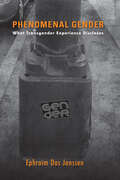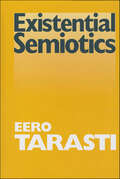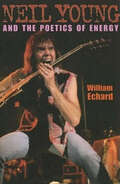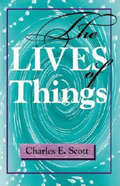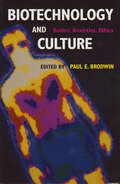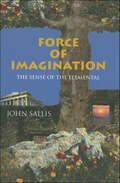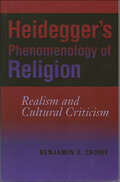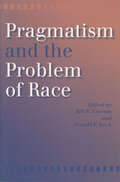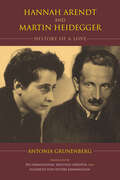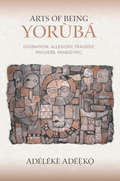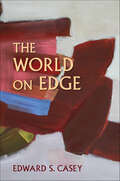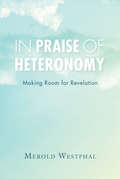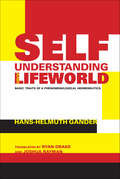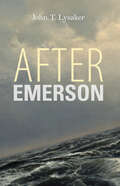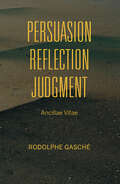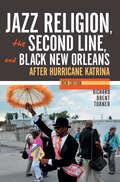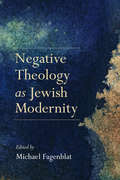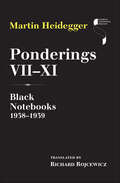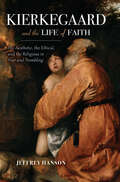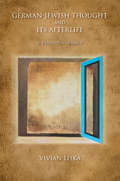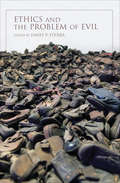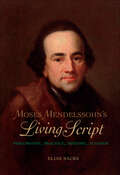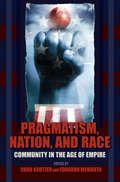- Table View
- List View
Ponderings XII–XV: Black Notebooks, 1939–1941 (Studies in Continental Thought)
by Martin HeideggerPonderings XII–XV is third in a series of four "Black Notebooks" which Martin Heidegger composed in the early years of World War II. As always with Heidegger, the thoughts expressed here are not superficial reflections on current events, but instead penetrate deeply into them in order to contemplate their historical importance. Throughout his ponderings, Heidegger meditates on the call for an antidote to the rampant technological attitude which views all things with a dismissive consumer mentality. Although this volume caused quite a scandal when originally published in German due to references to World-Judaism, English readers with access to the full text can now judge for themselves what Heidegger means in his use of that term. In style, this notebook is less aphoristic and more sustained than the previous ones, but remains probing, challenging, and fascinating.
Sites of Exposure: Art, Politics, and the Nature of Experience (Studies in Continental Thought)
by John RussonJohn Russon draws from a broad range of art and literature to show how philosophy speaks to the most basic and important questions in our everyday lives. In Sites of Exposure, Russon grapples with how personal experiences such as growing up and confronting death combine with broader issues such as political oppression, economic exploitation, and the destruction of the natural environment to make life meaningful. His is cutting-edge philosophical work, illuminated by original and rigorous thinking that relies on cross-cultural communication and engagement with the richness of human cultural history. These probing interpretations of the nature of phenomenology, the philosophy of art, history, and politics, are appropriate for students and scholars of philosophy at all levels.
Phenomenal Gender: What Transgender Experience Discloses
by Ephraim Das JanssenA philosophical examination of gender through the scope of phenomenology.Just what is gender, and what can be expected of it when dealing with identity, justice, and equality? Ephraim Das Janssen uses a phenomenological approach to challenge and dismantle the way gender is currently understood. Janssen questions ideas that have formerly been taken for granted, as individuals did during the Civil Rights movement, the women’s movement, and the LGBT rights movement. In so doing he recasts the moral debate about gender and grounds his analysis in observable aspects such as clothing and social roles and how these can imply transgression and questioning. Janssen shakes the very core of gender through a deep engagement with Being and the structures that confine our contemporary notions.“Original in its reach and ambitious in scope, this book is poised to make an important contribution to Heidegger studies, to phenomenologies of the body, and to transgender studies.” —Gayle Salamon, author of Assuming a Body
Existential Semiotics: Essays In Existential Semiotics (Advances in Semiotics #35)
by Eero TarastiExistential semiotics involves an a priori state of signs and their fixation into objective entities. These essays define this new philosophical field.
Neil Young and the Poetics of Energy
by William Echard“This book uniquely and successfully sustains a cohesive analysis of the work, career, and reception of a single artist . . . Neil Young.” —Daniel Cavicchi, author of Tramps Like UsAs a writer in Wired magazine puts it, Neil Young is a “folk-country-grunge dinosaur [who has been] reborn (again) as an Internet-friendly, biodiesel-driven, multimedia machine.” In Neil Young and the Poetics of Energy, William Echard stages an encounter between Young’s challenging and ever-changing work and current theories of musical meaning—an encounter from which both emerge transformed.Echard roots his discussion in an extensive review of writings from the rock press as well as his own engagement as a fan and critical theorist. How is it that Neil Young is both a perpetual outsider and critic of rock culture, and also one of its most central icons? And what are the unique properties that have lent his work such expressive force? Echard delves into concepts of musical persona, space, and energy, and in the process illuminates the complex interplay between experience, musical sound, social actors, genres, styles, and traditions.Readers interested primarily in Neil Young, or rock music in general, will find a new way to think and talk about the subject, and readers interested primarily in musical or cultural theory will find a new way to articulate and apply some of the most exciting current perspectives on meaning, music, and subjectivity.“A fascinating and unique reading of Neil Young’s music.” —Literary Review of Canada“[An] intriguing, elegantly written analysis of Young . . . Exemplifies the fruitful union of musicology and cultural studies.” —Cotten Seiler, Dickinson College
The Lives of Things (Studies in Continental Thought)
by Charles E. Scott“[Scott] argues that things have lives beyond our cognitive grasp but are nonetheless formative of memories . . . thought, language, and action” (Choice).In The Lives of Things, Charles E. Scott reconsiders our relationships with ordinary, everyday things and our capacity to engage them in their particularity. He takes up the Greek notion of phusis, or physicality, as a way to point out limitations in refined and commonplace views of nature and the body as well as a device to highlight the often-overlooked lives of things that people encounter. Scott explores questions of unity, purpose, coherence, universality, and experiences of wonder and astonishment in connection with scientific fact and knowledge. He develops these themes with lightness and wit, ultimately articulating a new interpretation of the appearances of things that are beyond the reach of language and thought.“Like Foucault and Levinas before him, though in very different ways, Scott makes an oblique incision into phenomenology . . . [it is] the kind of book to which people dazed by the specters of nihilism will be referred by those in the know.” —David Wood“Refreshing and original.” —Edward S. Casey“This new work situates Scott . . . as a leading American scholar in the Continental tradition. In this important new contribution, he argues that things have lives beyond our cognitive grasp but are nonetheless formative of memories (biological, institutional, and cultural), thought, language, and action. Scott’s argument underscores the importance of the physicality (phusis) of things, which has been sidelined in philosophical thought. Dewey’s and Heidegger’s consideration of physicality and the relation between the pragmatist and Continental traditions are built on to develop an account of phusis that emphasizes animation, lightness, density, and the thereness of physicality. Scott’s analysis of density, luminosity, and physicality in Foucault’s and Heidegger’s work and of the displacement of subjectivity is incisive and critical. His final chapter on nihilism is a significant contribution in rethinking nihilism’s negative connotations and resituating it as allowing for a multiplicity of discourses, for regions of recognition, and for life-affirming experiences. Scott’s wit and personal experiences are woven throughout the text. Highly recommended for upper-division undergraduates through faculty.” —N. A. McHugh, Choice
Biotechnology and Culture: Bodies, Anxieties, Ethics
by Paul E. BrodwinEssays on technology’s effect on our relationship with our bodies: “A timely and perceptive look . . . at some of the most anxiety producing issues of the day.” —Paul Rabinow, University of California, BerkeleyAs birth, illness, and death increasingly come under technological control, struggles arise over who should control the body and define its limits and capacities. Biotechnologies turn the traditional “facts of life” into matters of expert judgment and partisan debate. They blur the boundary separating people from machines, male from female, and nature from culture. In these diverse ways, they destroy the “gold standard” of the body, formerly taken for granted.Biotechnologies become a convenient, tangible focus for political contests over the nuclear family, legal and professional authority, and relations between the sexes. Medical interventions also transform intimate personal experience: giving birth, building new families, and surviving serious illness now immerse us in a web of machines, expert authority, and electronic images. We use and imagine the body in radically different ways, and from these emerge new collective discourses of morality and personal identity.This book brings together historians, anthropologists, cultural critics, and feminists to examine the broad cultural effects of technologies such as surrogacy, tissue-culture research, and medical imaging. The moral anxieties raised by biotechnologies and their circulation across class and national boundaries provide other interdisciplinary themes for discourse in these essays. The authors favor complex social dramas of the refusal, celebration, or ambivalent acceptance of new medical procedures. Eschewing polemics or pure theory, contributors show how biotechnology collides with everyday life and reshapes the political and personal meanings of the body.Contributors include Paul Brodwin, Lisa Cartwright, Thomas Csordas, Gillian Goslinga-Roy, Deborah Grayson, Donald Joralemon, Hannah Landecker, Thomas Laqueur, Robert Nelson, Susan Squier, Janelle Taylor, and Alice Wexler.“This impressive collection offers a number of rich examples of why the development of anthropological studies of science, technology, and their disruptive social effects is a leading edge of critical enquiry.” —Arthur Kleinman, Harvard University
Force of Imagination: The Sense of the Elemental (Studies in Continental Thought)
by John SallisForce of ImaginationThe Sense of the ElementalJohn SallisA bold and original investigation into how imagination shapes thought and feeling."This is a bold new direction for the author, one that he takes in an arresting and convincing manner. . . . a powerful, original approach to what others call 'ecology' but what Sallis shows to be a question of the status of the earth in philosophical thinking at this historical moment." —Edward S. CaseyIn this major original work, John Sallis probes the very nature of imagination and reveals how the force of imagination extends into all spheres of human life. While drawing critically on the entire history of philosophy, Sallis's work takes up a vantage point determined by the contemporary deconstruction of the classical opposition between sensible and intelligible. Thus, in reinterrogating the nature of imagination, Force of Imagination carries out a radical turn to the sensible and to the elemental in nature. Liberated from subjectivity, imagination is shown to play a decisive role both in drawing together the moments of our experience of sensible things and in opening experience to the encompassing light, atmosphere, earth, and sky. Set within this elemental expanse, the human sense of time, of self, and of the other proves to be inextricably linked to imagination and to nature. By showing how imagination is formative for the very opening upon things and elements, this work points to the revealing power of poetic imagination and casts a new light on the nature of art.John Sallis is Liberal Arts Professor of Philosophy at Pennsylvania State University. His previous books include Being and Logos: Reading the Platonic Dialogues; Shades—Of Painting at the Limit; Stone; Chorology: On Beginning in Plato's Timaeus (all published by Indiana University Press), Crossings: Nietzsche and the Space of Tragedy and Double Truth.Studies in Continental Thought—John Sallis, editorContentsProlusionsOn (Not Simply) BeginningRemembranceDuplicity of the ImageSpacing the ImageTractive ImaginationThe ElementalTemporalitiesProprietiesPoetic Imagination
Heidegger's Phenomenology of Religion: Realism and Cultural Criticism (Philosophy of Religion)
by Benjamin D. CroweThroughout his long and controversial career, Martin Heidegger developed a substantial contribution to the phenomenology of religion. In Heidegger's Phenomenology of Religion, Benjamin D. Crowe examines the key concepts and developmental phases that characterized Heidegger's work. Crowe shows that Heidegger's account of the meaning and structure of religious life belongs to his larger project of exposing and criticizing the fundamental assumptions of late modern culture. He reveals Heidegger as a realist through careful readings of his views on religious attitudes and activities. Crowe challenges interpretations of Heidegger's early efforts in the phenomenology of religion and later writings on religion, including discussions of Greek religion and Hölderlin's poetry. This book is sure to spark discussion and debate as Heidegger's work in religion and the philosophy of religion becomes increasingly important to scholars and beyond.
Pragmatism and the Problem of Race
by Bill E. Lawson Donald F. KochHow should pragmatists respond to and contribute to the resolution of one of America's greatest and most enduring problems? Given that the most important thinkers of the pragmatist movement--Charles S. Peirce, William James, John Dewey, and George Herbert Mead--said little about the problem of race, how does their distinctly American way of thinking confront the hardship and brutality that characterizes the experience of many African Americans in this country? In 12 thoughtful and provocative essays, contemporary American pragmatists connect ideas with action and theory with practice to come to terms with this seemingly intractable problem. Exploring themes such as racism and social change, the value of the concept of race, the role of education in ameliorating racism, and the place of democracy in dealing with the tragedy of race, the voices gathered in this volume consider how pragmatism can focus new attention on the problem of race.Contributors are Michael Eldridge, Eddie S. Glaude, Jr., Judith M. Green, D. Micah Hester, Donald F. Koch, Bill E. Lawson, David E. McClean, Gregory F. Pappas, Scott L. Pratt, Alfred E. Prettyman, John R. Shook, Paul C. Taylor, and Cornel West.
Hannah Arendt and Martin Heidegger: History of a Love (Studies in Continental Thought)
by Antonia Grunenberg Elizabeth von Witzke BirminghamA biographical account of two major thinkers of the twentieth century, a relationship marked as much by estrangement and distance as reunion and friendship.How could Hannah Arendt, a German Jew who fled Germany in 1931, have reconciled with Martin Heidegger, whom she knew had joined and actively participated in the Nazi Party? In this remarkable biography, Antonia Grunenberg tells how the relationship between Arendt and Heidegger embraced both love and thought and made their passions inseparable, both philosophically and romantically. Grunenberg recounts how the history between Arendt and Heidegger is entwined with the history of the twentieth century with its breaks, catastrophes, and crises. Against the violent backdrop of the last century, she details their complicated and often fissured relationship as well as their intense commitments to thinking.“Focuses on a relationship that began when Arendt was a student in the 1920s, was broken between 1933 and 45, and resumed after the war.” —The Chronicle of Higher Education
Arts of Being Yoruba: Divination, Allegory, Tragedy, Proverb, Panegyric
by Adélékè AdéèkóThere is a culturally significant way of being Yorùbá that is expressed through dress, greetings, and celebrations—no matter where in the world they take place. Adélékè Adék documents Yorùbá patterns of behavior and articulates a philosophy of how to be Yorùbá in this innovative study. As he focuses on historical writings, Ifá divination practices, the use of proverbs in contemporary speech, photography, gendered ideas of dressing well, and the formalities of ceremony and speech at celebratory occasions, Adéékó contends that being Yorùbá is indeed an art and Yorùbá-ness is a dynamic phenomenon that responds to cultural shifts as Yorùbá people inhabit an increasingly globalized world.
The World on Edge (Studies in Continental Thought)
by Edward S. CaseyFrom one of continental philosophy's most distinctive voices comes a creative contribution to spatial studies, environmental philosophy, and phenomenology. Edward S. Casey identifies how important edges are to us, not only in terms of how we perceive our world, but in our cognitive, artistic, and sociopolitical attentions to it. We live in a world that is constantly on edge, yet edges as such are rarely explored. Casey systematically describes the major and minor edges that configure the human and other-than-human realms, including our everyday experience. He also explores edges in high- stakes situations, such as those that emerge in natural disasters, moments of political and economic upheaval, and encroaching climate change. Casey's work enables a more lucid understanding of the edge-world that is a necessary part of living in a shared global environment.
In Praise of Heteronomy: Making Room for Revelation
by Merold WestphalRecognizing the essential heteronomy of postmodern philosophy of religion, Merold Westphal argues against the assumption that human reason is universal, neutral, and devoid of presupposition. Instead, Westphal contends that any philosophy is a matter of faith and the philosophical encounter with theology arises from the very act of thinking. Relying on the work of Spinoza, Kant, and Hegel, Westphal discovers that their theologies render them mutually incompatible and their claims to be the voice of autonomous and universal reason look dubious. Westphal grapples with this plural nature of human thought in the philosophy of religion and he forwards the idea that any appeal to the divine must rest on a historical and phenomenological analysis.
Self-Understanding and Lifeworld: Basic Traits of a Phenomenological Hermeneutics (Studies in Continental Thought)
by Hans-Helmuth GanderWhat are the foundations of human self-understanding and the value of responsible philosophical questioning? Focusing on Heidegger's early work on facticity, historicity, and the phenomenological hermeneutics of factical-historical life, Hans-Helmuth Gander develops an idea of understanding that reflects our connection with the world and other, and thus invites deep consideration of phenomenology, hermeneutics, and deconstruction. He draws usefully on Husserl's phenomenology and provides grounds for exchange with Descartes, Dilthey, Nietzsche, Gadamer, Ricoeur, and Foucault. On the way to developing a contemporary hermeneutical philosophy, Gander clarifies the human relation to self in and through conversation with Heidegger's early hermeneutics. Questions about reading and writing then follow as these are the very actions that structure human self-understanding and world understanding.
After Emerson (American Philosophy)
by John T. LysakerThe author of Emerson & Self-Culture shares essays covering such themes as identity, experience, ethics, poetry, philosophy, history, and race.John T. Lysaker works between and weaves together questions and replies in philosophical psychology, Emerson studies, and ethics in this book of deep existential questioning. Each essay in this atypical, philosophical book employs recurring terms, phrases, and questions that characterize our contemporary age. Setting out from the idea of where we are in an almost literal sense, Lysaker takes readers on an intellectual journey into thematic concerns and commitments of broad interest, such as the nature of self and self-experience, ethical life, poetry and philosophy, and history and race. In the manner of Emerson, Cavell, and Rorty, Lysaker’s vibrant writing is certain to have a transformative effect on American philosophy today.“An original and stimulating book, manifesting a level of reflection and existential concern of the highest order. It is intellectually and personally honest.” —Robert E. Innis, author of Susanne Langer in Focus“There is something fresh and hence refreshing in the manner in which John T. Lysaker takes up familiar topics. He shows, with both arresting details and an evolving design, how the conduct of life (to use Emerson’s expression) demands a form of thought frequently at odds with contemporary fashions and preoccupations, with institutionally entrenched approaches and all too rigidly policed discourses.” —Vincent Colapietro, author of Experience, Interpretation, and Community“Acknowledged as one of his generations premier Emerson scholars, Lysaker goes beyond his earlier work, Emerson & Self-Culture . . . [T]he writing is stimulating, vibrant, challenging, risky, and fecund. Recommended.” —D. B. Boersma, Choice
Persuasion, Reflection, Judgment: Ancillae Vitae (Studies in Continental Thought)
by Rodolphe GaschéGasché expounds on Aristotle, Heidegger, and Arendt in “a major interpretative achievement that underscores what is at stake in political thought” (Notre Dame Philosophical Reviews).As one of the most respected voices of Continental philosophy today, Rodolphe Gasché pulls together Aristotle’s conception of rhetoric, Martin Heidegger’s debate with theory, and Hannah Arendt’s conception of judgment in a single work on the centrality of these themes as fundamental to human flourishing in public and political life. Gasché’s readings address the distinctively human space of the public square and the actions that occur there, and his valorization of persuasion, reflection, and judgment reveals new insight into how the philosophical tradition distinguishes thinking from other faculties of the human mind.“Here Rodolphe Gasche is at his best: rigorous, scholarly, creative, forceful, laser focused on the issues at stake, learned, thoughtful, and original. He demands much of his readers, but reading his work is rewarding in ways that can be profoundly affecting.” —Dennis J. Schmidt, author of Between Word and Image“Rodolphe Gasche has long been one of the most meticulous readers of texts on the philosophical scene and here he once again offers a master class in how to do philosophy through interpretation.” —Robert Bernasconi, author of How to Read Sartre
Jazz Religion, the Second Line, and Black New Orleans: After Hurricane Katrina
by Richard Brent TurnerThis scholarly study demonstrates “that while post-Hurricane Katrina New Orleans is changing, the vibrant traditions of jazz . . . must continue” (Journal of African American History).An examination of the musical, religious, and political landscape of black New Orleans before and after Hurricane Katrina, this revised edition looks at how these factors play out in a new millennium of global apartheid. Richard Brent Turner explores the history and contemporary significance of second lines—the group of dancers who follow the first procession of church and club members, brass bands, and grand marshals in black New Orleans’s jazz street parades.Here music and religion interplay, and Turner’s study reveals how these identities and traditions from Haiti and West and Central Africa are reinterpreted. He also describes how second line participants create their own social space and become proficient in the arts of political disguise, resistance, and performance.
Negative Theology as Jewish Modernity
by Michael FagenblatNegative theology is the attempt to describe God by speaking in terms of what God is not. Historical affinities between Jewish modernity and negative theology indicate new directions for thematizing the modern Jewish experience. Questions such as, What are the limits of Jewish modernity in terms of negativity? Has this creative tradition exhausted itself? and How might Jewish thought go forward? anchor these original essays. Taken together they explore the roots and legacies of negative theology in Jewish thought, examine the viability and limits of theorizing the modern Jewish experience as negative theology, and offer a fresh perspective from which to approach Jewish intellectual history.
Ponderings VII–XI: Black Notebooks, 1938–1939 (Studies in Continental Thought)
by Martin HeideggerThrough these broad and sprawling notebooks, Heidegger offers fascinating opinions on Holderlin, Nietzsche, Wagner, Wittgenstein, Pascal, and many others. The importance of the Black Notebooks transcends Heidegger's relationship with National Socialism. These personal notebooks contain reflections on technology, art, Christianity, the history of philosophy, and Heidegger's attempt to move beyond that history into another beginning.
Kierkegaard and the Life of Faith: The Aesthetic, the Ethical, and the Religious in Fear and Trembling
by Jeffrey Hanson“A thorough, considered, and provocative treatment of what justifiably remains Kierkegaard’s most famous book.” —Marginalia Review of BooksSoren Kierkegaard’s masterful work Fear and Trembling interrogates the story of Abraham and Isaac, finding there one of the most profound and critical dilemmas in all of religious philosophy. While several commentaries and critical editions exist, Jeffrey Hanson offers a distinctive approach to this crucial text.Hanson gives equal weight to all three of Kierkegaard’s “problems,” dealing with Fear and Trembling as part of the entire corpus of Kierkegaard’s thought and putting all parts into relation with each other. Additionally, he offers a distinctive analysis of the Abraham story and other biblical texts, giving particular attention to questions of poetics, language, and philosophy, especially as each relates to the aesthetic, the ethical, and the religious.Presented in a thoughtful and fresh manner, Hanson’s claims are original and edifying. This new reading of Kierkegaard will stimulate fruitful dialogue on well-traveled philosophical ground.
German-Jewish Thought and Its Afterlife: A Tenuous Legacy
by Vivian LiskaInGerman-Jewish Thought and Its Afterlife,Vivian Liska innovatively focuses on the changing form, fate and function of messianism, law, exile, election, remembrance, and the transmission of tradition itself in three different temporal and intellectual frameworks: German-Jewish modernism, postmodernism, and the current period. Highlighting these elements of theJewish tradition in the works of Franz Kafka, Walter Benjamin, Gershom Scholem, Hannah Arendt, and Paul Celan, Liska reflects on dialogues and conversations between themandonthereception of their work.She shows how this Jewish dimension of their writings is transformed, but remains significant in the theories of Maurice Blanchot and Jacques Derrida and how it is appropriated, dismissed or denied by some of the most acclaimed thinkers at the turn of the twenty-first century such as Giorgio Agamben, Slavoj i ek, and Alain Badiou.
Ethics and the Problem of Evil (Indiana Series in the Philosophy of Religion)
by John Hare Laura Garcia Stephen Maitzen Bruce Russell Marilyn McCord Adams Linda Zagzebski Stephen J. WykstraProvocative essays that seek &“to turn the attention of analytic philosophy of religion on the problem of evil . . . towards advances in ethical theory&” (Reading Religion). The contributors to this book—Marilyn McCord Adams, John Hare, Linda Zagzebski, Laura Garcia, Bruce Russell, Stephen Wykstra, and Stephen Maitzen—attended two University of Notre Dame conferences in which they addressed the thesis that there are yet untapped resources in ethical theory for affecting a more adequate solution to the problem of evil. The problem of evil has been an extremely active area of study in the philosophy of religion for many years. Until now, most sources have focused on logical, metaphysical, and epistemological issues, leaving moral questions as open territory. With the resources of ethical theory firmly in hand, this volume provides lively insight into this ageless philosophical issue. &“These essays—and others—will be of primary interest to scholars working in analytic philosophy of religion from a self-consciously Christian standpoint, but its audience is not limited to such persons. The book offers illustrative examples of how scholars in philosophy of religion understand their aims and how they go about making their arguments . . . hopefully more work will follow this volume&’s lead.&”—Reading Religion &“Recommended.&”—Choice
Moses Mendelssohn's Living Script: Philosophy, Practice, History, Judaism
by Elias SacksMoses Mendelssohn (1729–1786) is often described as the founder of modern Jewish thought and as a leading philosopher of the late Enlightenment. One of Mendelssohn's main concerns was how to conceive of the relationship between Judaism, philosophy, and the civic life of a modern state. Elias Sacks explores Mendelssohn's landmark account of Jewish practice—Judaism's "living script," to use his famous phrase—to present a broader reading of Mendelssohn's writings and extend inquiry into conversations about modernity and religion. By studying Mendelssohn's thought in these dimensions, Sacks suggests that he shows a deep concern with history. Sacks affords a view of a foundational moment in Jewish modernity and forwards new ways of thinking about ritual practice, the development of traditions, and the role of religion in society.
Pragmatism, Nation, and Race: Community in the Age of Empire
by Eduardo Mendieta Chad KautzerPragmatism has been called "the chief glory of our country's intellectual tradition" by its supporters and "a dog's dinner" by its detractors. While acknowledging pragmatism's direct ties to American imperialism and expansionism, Chad Kautzer, Eduardo Mendieta, and the contributors to this volume consider the role pragmatism plays, for better or worse, in current discussions of nationalism, war, race, and community. What can pragmatism contribute to understandings of a diverse nation? How can we reconcile pragmatism's history with recent changes in the country's racial and ethnic makeup? How does pragmatism help to explain American values and institutions and fit them into new national and multinational settings? The answers to these questions reveal pragmatism's role in helping to nourish the fundamental ideas, politics, and culture of contemporary America.


